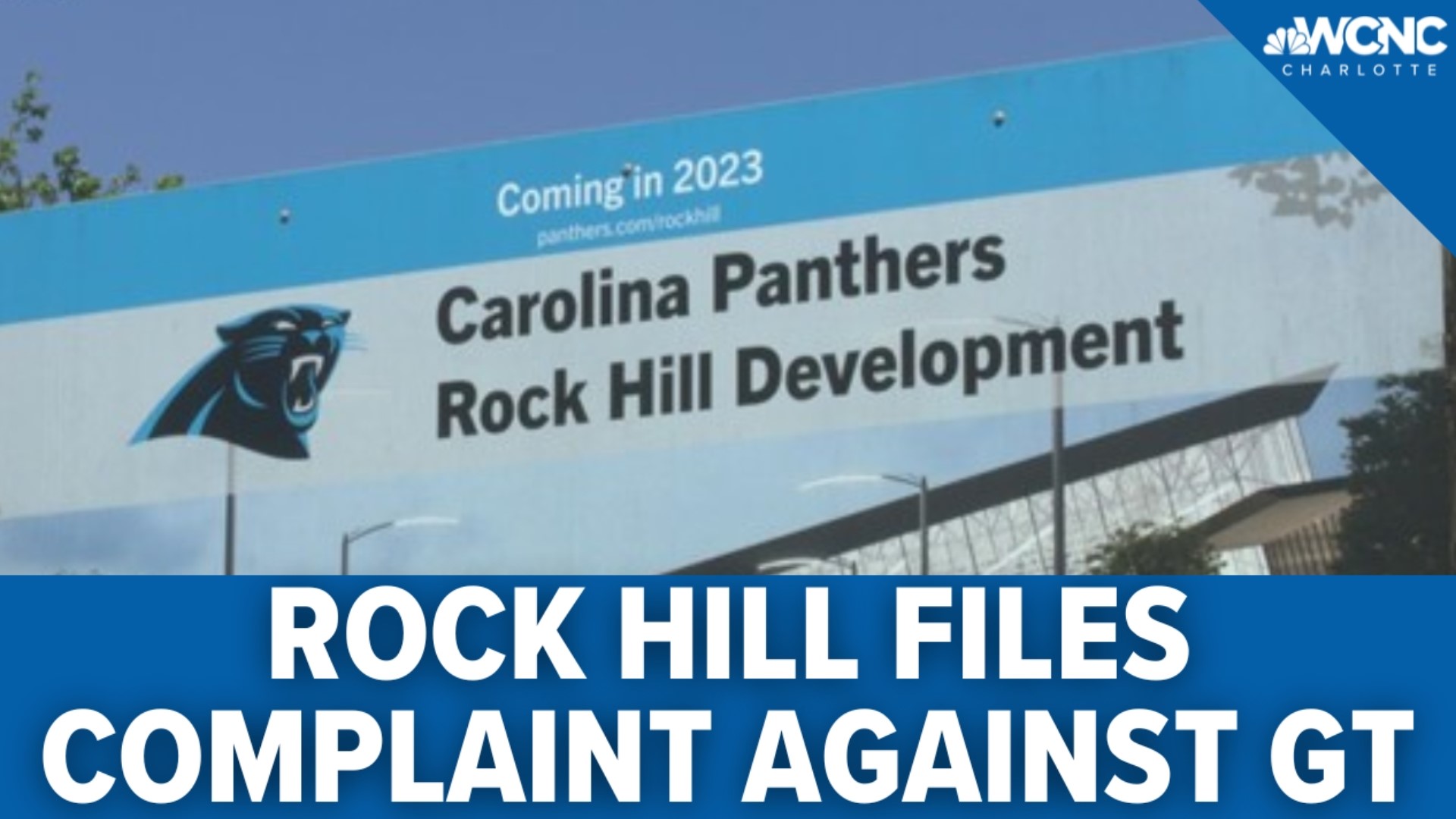ROCK HILL, S.C. — The city of Rock Hill filed a legal response Wednesday against David Tepper's GT Real Estate Holdings in response to the abandoned construction of the Carolina Panthers Training Facility and Headquarters project.
At issue is a disagreement between the city and GT Real Estate Holdings over the use of, and the issuance of, bonds to help fund the project. The city accuses GT Real Estate of not being transparent in releasing information and details of the project that would have helped fund the bond process.
According to the document, in January 2022, the city of Rock Hill was prepared to proceed with market bonds of at least $135 million, but the city claims GT Real Estate told it to not proceed with the bond offering. That same day, the city of Rock Hill said GT Real Estate told it the project would need to be called back in scope to only include the Panthers' facilities and not some other buildings on the complex including a new medical office building and hotels.
Back in March, Tepper's company halted construction at the site citing missed payments from financial partners, including their accusation the city failed to provide $225 million in bonds for roads, sidewalks, and other public infrastructure at the site.
INTERACTIVE TIMELINE: Panthers' Rock Hill training facility
In their legal response Wednesday, the city said they are seeking $20 million in financial damages. Also, they are asking a bankruptcy judge to award them a trial by jury. The city is asking for a declaratory judgment, which is a binding ruling from the court, outlying its relationship with the defendant -- in this case GT Real Estate Holdings -- and its rights within that relationship.
GT Real Estate submitted a plan to a bankruptcy court in August to pay back creditors. Under a reorganization plan submitted to the court, Tepper's other company, DT Sports Holding, would provide $82 million to their sister company, GT Real Estate, to make payments. The plan included paying construction contractors $60.5 million and York County $21.165 million.
In June, York County sued to accuse Tepper's company of misusing $21 million of public funding provided for the project. Since GT Real Estate filed for bankruptcy, this limited the options available to the city of Rock Hill in terms of what remedies it could pursue.
The new document filed Wednesday by the city outlines an over-three-year back-and-forth between themselves, GT Real Estate, York County and other municipal partners in how bonds could or could not be used to finance different parts of the project.
The filing alleges the city of Rock Hill continually informed GT Real Estate there were structural issues with the city's bonds, which were predicated upon assumptions regarding the taxable value of the finished facility and the percentage of future tax revenue that other players, for example, York County, were willing to plow back into the venture. In summary, the amount of bonds the city could provide is proportional to the amount of private investment provided by GT Real Estate.
"The city repeatedly communicated to [GT Real Estate] that the marketability of the bonds would be materially improved if [GT Real Estate] would provide additional, specific development details regarding the private investment in the Project and identify the master developer for the Project, but [GT Real Estate] repeatedly failed to do so," the document states.
The city also alleges GT Real Estate failed to provide sufficient detail regarding the use of the bond money to satisfy IRS requirements so the bonds could be 100% tax exempt. The document claims GT Real Estate suggested: "maybe the simplest thing to do is make 10-15% of the bonds taxable."
"[GT Real Estate] was advised on more than one occasion that the marketability of the bonds would be severely hampered if the bonds could not be issued on federal tax-exempt basis," the document reads.
Rock Hill points to this disagreement as to why the project was so delayed. The city goes as far as to accuse GT Real Estate of fraud, saying "the circumstances surrounding [GT Real Estate's] breach as described herein demonstrate that [GT Real Estate had fraudulent intent."
The document filed Wednesday is an "Adversary Proceeding," which carries the same meaning as a lawsuit in other courts, according to the United States Bankruptcy Court.
"The city has not ... given public statements about this because it is a legal matter," Rock Hill Mayor John Gettys said Wednesday. "Facts are stubborn things."
Thursday, Tepper's lawyers responded to the complaint filed by the city of Rock Hill saying the city's complaint is full of "false and incendiary allegations" and are "utterly meritless," saying Rock Hill promised to issue bonds but never did.
GT Real Estate previously said they plan to sell the site, and partially constructed building, to pay the city of Rock Hill at least $20 million from the available net proceeds after handling clean-up and senior claims.


